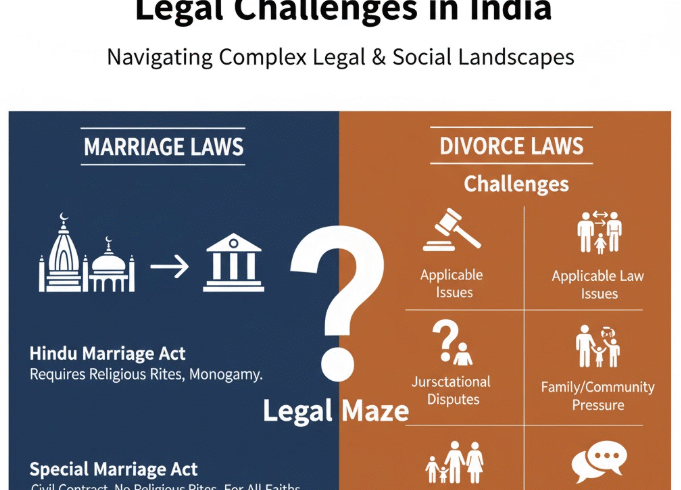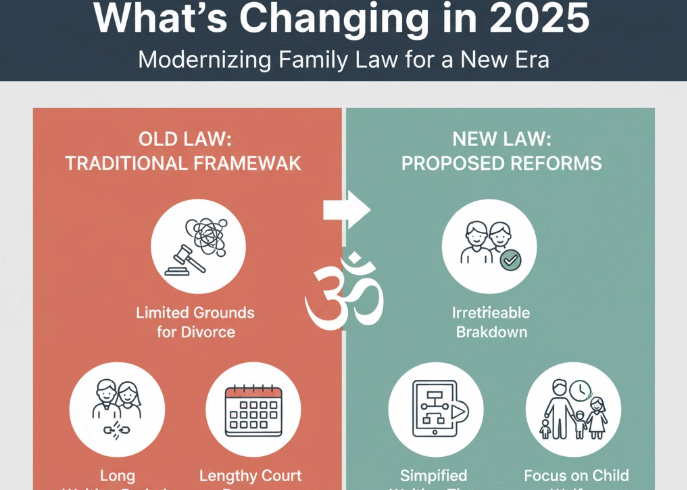Christian Divorce Rights for Women in India: A Complete Guide
It’s never easy to get a divorce, but knowing your rights will at least make the process less perplexing. If you are a Christian woman in India dealing with marital trouble, then knowing about the law that will enable you to terminate your marriage is crucial. In plain language, this guide sifts through everything, so that you get the information you need to make choices about your future.
What are the Laws Applicable to Christian Marriages in India?
In India, there are two main laws that regulate Christian marriages and divorces:
- The Indian Divorce Act, 1869 – It is the main law for Christians seeking divorce.
- The Indian Christian Marriage Act, 1872 – It describes how Christian marriages are solemnized and registered.
Christian divorce laws, in contrast with personal law systems of Hindu or Muslim regulation, are uniform throughout India. If you live in Delhi, Mumbai or a small town in Kerala, your rules are the same.
Grounds for Divorce: When Can a Christian Wife Seek Divorce?
The law specifies grounds (called “grounds”) that Christian women can use to seek a divorce. If you have legitimate grounds, you do not need your husband’s consent to begin the process.
Most Common Grounds You Can Use to Divorce
1. Adultery (Cheating)
If your spouse has committed adultery and had sexual relations with another person, you can file for divorce. Such evidence will include photographs, messages, hotel bills or witness statements.
2. Cruelty (Physical or Mental Torture)
The word “cruelty” is not just limited to physical violence. Mental torture counts too. This includes:
- Beating or hitting you
- Constant insults and humiliation
- Threats to your life
- Withholding food or essentials from you
- Making unreasonable demands for dowry
- Making you live in an unhealthy way
3. Desertion (Abandonment)
If your husband has deserted you for no good reason, and hasn’t lived with you for at least two years in a row, you can apply for divorce. He must have deserted you both physically and mentally, against your will.
4. Conversion to Another Religion
If your husband has converted to another religion (including Hinduism, Islam or any other religious faith), you can file for a divorce on this ground.
5. Mental Illness
If the mental illness is an incurable type that makes it impossible to live with your spouse, this can also be a ground for divorce. Proof will have to be in the form of medical certificates.
6. Severe Disease
If your husband is afflicted with leprosy (defined loosely as a severe skin disease) for at least 2 years, you have the right to seek divorce.
7. Unheard From (Presumed Dead)
If your husband has disappeared, or not been seen or heard from in at least seven years and no one knows if he is still alive, you can divorce. The court can declare him dead.
Grounds Available Exclusively to Women
The law acknowledges that women have particular hardships. Here are other reasons that only Christian women can claim:
1. Rape, Sodomy or Bestiality
If your husband has raped you, committed an unnatural act of sexual intimacy with you allegedly under force, and had intercourse with animals after the marriage, then divorce can be sought.
2. Bigamy (Second Marriage)
If your husband remarries you can get divorce. Bigamy is illegal in India for Christians.
3. Married Before 15
If you married before the age of fifteen and have not lived with your husband since turning fifteen, you may file for annulment at any time before your eighteenth birthday.
For more information on family law matters, visit https://zistalegalis.com.
How to File for Divorce: Step-by-Step Process
Step 1: Gather Your Documents
Here’s what you need to collect:
- Marriage certificate
- Proof of residence: Aadhaar card, voter ID, ration card, etc.
- Evidence supporting your grounds: medical reports, police complaints, photographs, witness statements
- Income documents: if you’re claiming maintenance
Your grounds may require more documents.
Step 2: Hire a Lawyer
You can file yourself, but a lawyer will make the process easier. The lawyer will draft your petition properly and represent you in court. Make sure to hire a lawyer experienced in family law.
Step 3: File the Divorce Petition
Your lawyer will create a divorce petition. This is a legal document that describes:
- Your marriage
- The problems you’ve had
- Grounds for divorce
- What you’re asking from the court: divorce, maintenance, custody
The petition is filed in the District Court where:
- You live now, or
- Your husband lives now, or
- You both lived together last time
Step 4: Court Notice to Your Husband
The court will send a notice to your husband that a divorce case has been filed, and he can respond. He is usually given 30 days to do so.
Step 5: Your Husband’s Response
Your husband may:
- Agree to divorce: It makes it easier and faster
- Disagree: Contest the divorce
- File a counter-case with his own claims
Step 6: Evidence and Hearings
If your husband has disagreed, you have to:
- Present evidence: documents, witnesses
- Go to court for hearings
- Answer questions your husband’s lawyer asks
This will take time, a few months to years, depending on complexity.
Step 7: Final Judgment
The judge will decide after hearing both sides whether you get a divorce or not. If he orders divorce, you will get a divorce decree.
How Long Does a Divorce Take?
The actual time depends on:
- Court workload in your area
- Whether your husband contests
- Difficulty of property and custody matters
- Number of hearings required
Your Financial Rights After Divorce
Alimony (Maintenance Money)
Christian wives have the authority to ask their husband for money. It is known as alimony or maintenance.
Types of Maintenance:
1. Temporary Maintenance (During the Case)
- Money paid during the divorce case
- Helps cover living expenses and legal costs
- Usually 20-25% of husband’s income
2. Permanent Alimony (After Divorce)
- One-time lump sum payment, OR
- Monthly payments for life or until remarriage
- Entirely dependent upon the husband’s income, your needs and length of marriage
How Much Can You Get?
Courts consider these factors:
- Your husband’s income and property
- Your own income (if you work)
- Your age, health, and education
- Number of years of marriage
- Your contribution to the household
- Standard of living during marriage
- Whether you are responsible for children
Typically courts will award 25-35% of the husband’s income, but there is no fixed rule. Each case is different.
Property Rights
Shared Household
If the house is in your husband’s name, and both of you lived there during marriage, you have a right to live there until a divorce is granted or other arrangements are made.
Jointly Owned Property
If the house, land or car is in both names, it belongs equally to each of you.
Gifts & Jewelry
Any gifts you receive (jewelry, clothing, personal items) are yours. Your husband is not able to take them away.
Stridhan
All gifts that you receive before, during and after marriage—any received at the time of betrothal, gifts by your parents, relatives or in-laws—belong exclusively to you.
You can learn more about women’s rights in India at the National Commission for Women.
Child Custody Rights
If you have children, custody of them may be the most emotional part of a divorce.
Who Gets the Children?
In India, the law is guided by the “child’s best interest”. The judge has to decide what’s in the child’s best interest for his or her welfare.
Factors Courts Consider:
- Child’s age (preschoolers typically remain with mother)
- Child’s preference (if age appropriate)
- Parent’s capacity to care and educate
- Parent’s financial stability
- Parent’s character and behavior
- Emotional attachment of the child to each parent
Types of Custody
| Type | What It Means |
|---|---|
| Physical | Where the child resides primarily |
| Legal | Who has decision-making authority (schooling, medical, religion) |
| Joint | Both parents make decisions about the child |
| Sole | One parent makes all legal guardianship decisions |
| Visitation | Right of non-custodial parent to visit with their child |
Important: Even if your husband has custody, you can still visit your children often. Courts will order a child to stay connected with both parents unless there is evidence that a parent poses a risk of danger or abuse.
Child Support
The non-custodial parent is obligated to pay child support for:
- Education fees
- Medical expenses
- Food and clothing
- Extracurricular activities
This continues until the child can afford to take care of himself (usually 18-21).
Mutual Consent Divorce: The Quick Way
This is far faster and less stressful than contested divorce.
Requirements:
- Both must agree to divorce
- Lived separate and apart for at least one year
- Must agree on spousal support, child custody and property division
- Will not live together again
Process:
- Submit joint petition in court (both must sign)
- First appearance: The court records what you have to say
- Cooling-off time: 6-18 months waiting time
- Second hearing: Court confirms that divorce will not be revoked
- Decree given if both still conforming
Pros: A lot quicker, cheaper and less emotional damage. You are dictating the terms, rather than allowing everything to be a judge’s discretion.
Special Protections for Women
Protection from Domestic Violence
Married or divorced women are covered under the Protection of Women from Domestic Violence Act, 2005 which offers protection from:
- Physical abuse
- Mental torture
- Economic abuse (denying money)
- Sexual abuse
What You Can Do:
- Lodge a complaint with the police station nearby
- Contact a Protection Officer or women’s helpline
- Obtain a restraining order that will prevent your husband from contacting you
- Stay in the shared household
- Seek financial compensation for injuries and damages
Dowry Harassment
If your husband or in-laws ask for dowry, or harass you for it:
- Lodge a case under Section 498A of Indian Penal Code
- This is punishable by imprisonment for a term of not more than three years
- Police must investigate immediately
- Add this to your divorce filing for added protections
For legal assistance, contact https://zistalegalis.com.
Important Things to Remember
You Don’t Require Your Husband’s Permission
Christian women can divorce on their own. You do not require his agreement to initiate the process.
Punishable for False Cases
While the law protects you, filing false cases can backfire. Keep the truth and provide real evidence.
Rights After Divorce
Christian women have rights to remarry after divorce. But you’ll have to wait until the divorce decree is final and a period for appeal has run (90 days).
Document Everything
Document everything that happens:
- Keep a journal documenting abuse or concerns
- Save receipts and other records of evidence
- Save text messages, emails, voicemails
- Keep call logs
- Take photographs of injuries
- Obtain medical records for any treatment
- File police complaints when necessary
Work Doesn’t Mean Maintenance Stops
Having a job doesn’t preclude you from receiving alimony. Courts will still award maintenance if there’s a big income disparity.
Common Mistakes to Avoid
1. Leaving the Marital Home
Don’t leave without first talking to a lawyer. This can be used as desertion against you.
2. Accepting Unfair Terms
Never agree to anything without legal advice, particularly involving property or custody.
3. Waiting
If you are being abused, there is no time to wait. Delays weaken your case.
4. Concealing Income
Be truthful about your money. Courts have a way of finding hidden assets, and dishonesty will only damage your credibility.
5. Using the Kids as Ammunition
It is not fair to cut off your husband from children. Courts view this negatively.
Frequently Asked Questions
Can I get a divorce if my husband does not want a divorce?
Yes. You may be able to get a divorce if you have reasonable grounds, even if your husband objects. It will take longer, but the court will decide based on evidence.
What if my husband lives abroad?
You can file for divorce in India if you married here or last lived together in India. The court will provide him notice via the appropriate channels.
Can I dismiss my divorce case later?
Yes, you may dismiss your case before a decree is entered. Nevertheless, there may be expenses you will have to cover.
Will I lose custody if I am not employed?
No. Courts take many other things into account besides just money. Your bond, care capacity and the child’s wish are worth more than mere money.
Can my husband refuse to pay alimony?
If the court gives him an order and he doesn’t comply, you can file a case for recovery. The court can garnish his wages, bank accounts or property to collect.
What happens to my husband’s pension after our divorce?
You could have the right to a portion of the pension, particularly if you were married for a number of years. This must be explicitly requested in divorce proceedings.
Can I use WhatsApp texts as proof?
Yes, electronic evidence such as WhatsApp messages, emails and call records are admissible in court if they have been properly verified.
Must I prove adultery with clear and positive evidence?
It’s hard to prove with direct proof, but if you gather enough circumstantial evidence (suspicious behavior, regular meetings, hotel stays) adultery can be established.
Your Path Forward
We know divorce can be tough but you do have legal rights that are protecting you. There are a number of protections in the Indian legal system for Christian women desirous of breaking an unhappy marriage.
Remember These Key Points:
- You deserve to live with dignity and respect
- Your legal right to financial security through alimony
- The well-being of your children is the court’s top concern
- Help is available even if you can’t afford it
The first step is always the most difficult, but know that you are not alone.
Take Action:
- Consult a family law attorney as soon as possible
- Write down any evidence that supports your grounds for divorce
- Know your rights—don’t accept less
- Connect with support groups for women
- Your primary focus should be your own safety and health
The road may be tough, but knowing your rights gives you the ability to make the best possible decisions for yourself and your children. You deserve to be happy and safe, and the law is on your side.
Disclaimer: This article is general information about the divorce rights of Christian women in India. Laws change, and every situation is different. For specific advice about your particular situation, consult a qualified attorney at https://zistalegalis.com.






